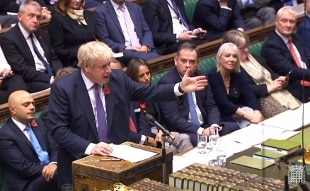- Brexit: Tusk, ok of the 27 to postponement to 31 January. And the EU asks London for a commissioner
- Brexit. Parliament reopens, Johnson challenges him to vote for mistrust
- Brexit, the British Parliament reopens. The Bercow speaker: "Welcome back!"
- Brexit, the Supreme Court considers the Parliament blockade illegal
Share
October 28, 2019The House of Commons has tonight rejected the motion presented by the British government to obtain early parliamentary elections on December 12th. The non-yes of the Labor opposition has prevented from reaching the necessary quorum of two thirds, as already on two other occasions. However, the Tory government is now the way to support the new proposal of 2 other opposition parties, Libdem and Snp, to go to the vote on December 9th, modifying by a simple majority from tomorrow the law in force on the elections."This parliament has exhausted its function". Thus Boris Johnson had argued the motion for early elections. Prime Minister Tory added that he "preferred to implement the Brexit" on October 31 as he had promised, but accused the Chamber of having postponed his deal and the opposition not to respect the 2016 referendum: the result is a postponement of " another three months "that the people do not want and at a cost of" a billion pounds a month more ".
Corbyn says no to Johnson: "it's not credible"
Labor leader Jeremy Corbyn said no to the motion presented by conservative prime minister Boris Johnson for calling elections on December 12th. "I do not trust the prime minister and the majority of the country does not trust," said Corbyn responding to Johnson in the House in a scorching climate. Corbyn accused the premier of having reverted to "all the promises" on Brexit and of wanting early elections, but not in December, at least until there is no guarantee that the no deal will not be "excluded from the table".
Tusk, yes of the 27 to Brexit referral
Earlier today there was the announcement of the President of the European Council Donald Tusk, regarding the decision of the 27 EU member states that had accepted the United Kingdom's request to postpone Brexit to 31 January 2020. Tusk had specified that the so-called "flextension" was accepted, indicating that London could also leave the EU before that date in the case of approval of the agreement negotiated by London with Brussels by the British parliament.
EU calls for London to appoint a commissioner
There was also a request to appoint 'his' European commissioner among those addressed to the British government by the EU as part of the green light for a new extension of Brexit. According to European sources interviewed by Ansa, the request for the appointment of the commissioner was forwarded to London, together with that of having the British ok to the extension, in parallel with the start of the so-called written procedure decided today by the EU ambassadors.
Announced by the president-designate Ursula Van Der Leyen last week and now formulated by the EU Council, the request in London to appoint its commissioner responds to the need dictated by the treaties based on the fact that Great Britain is and will probably still be an integral part of the EU when the new commission takes office, the same logic already applied in the case of the European elections.
However, the request risks complicating - and above all lengthening - the path that will lead to the establishment of the new European executive, which has already been postponed from November 1st to December 1st. At the moment it is not known if and when Boris Johnson will take a decision, fueling the uncertainty already determined by the fact that on the three candidate commissioners rejected by the European Parliament - the Hungarian, the Romanian and the French - only Budapest and Paris have so far presented new names. while Romania is still missing because it is faced with an unresolved government crisis.
As if that were not enough, according to the rumors gathered in Brussels, the Hungarian candidate - Oliver Varhelyi, current ambassador-permanent representative of Budapest at the EU - would not be appreciated by different parties, in particular the Angela Merkel CDU. In the face of this scenario, Von Der Leyen is currently moving with extreme caution and has made it known that he does not intend to change the allocation of portfolios, even for the new candidates he met today for the first time. Meanwhile, the name of those who could represent London with a 'full term' position began to circulate. The choice could fall on the current Commissioner Julian King who, being already well known in the EU context, would have the advantage of being able to pass the examination of the European Parliament quickly.

